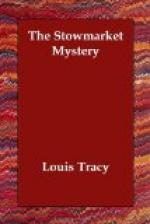“We don’t care a cent about that. Robert and I have both agreed that what Margaret has she keeps. There may, in course of time, be very good reason for this action. Anyhow, I have acted to please myself, and my father will, I am sure, approve of what I have done.”
Brett shook his head. No lawyer could approve of these rough-and-ready settlements of important family affairs.
“Has anyone telegraphed to Mrs. Capella?” he inquired.
“Yes,” said Robert, “I did. I just said ’Ooma dead; Capella reported seriously ill. Remain in Whitby. I will join you to-morrow evening.’ That, I thought, was enough for a start.”
It certainly was.
Soon there came excited messages from both Margaret and Helen demanding more details, whereupon Brett, who knew that suspense was more unbearable than full knowledge, sent a fairly complete account of occurrences.
During the next few days there was the usual commotion in the Press that follows the opening up of the secret records of a great and mysterious crime.
It came as a tremendous surprise to David Hume-Frazer to learn how many people were convinced of his innocence “all the time.” Being the central figure in the affair, he was compelled to remain at Beechcroft until Capella and Ooma were interred, and the coroner’s jury, at a deferred inquest, had recorded their verdict that the wretched Japanese descendant of the Scottish Jacobite was not only doubly a murderer, but guilty of the heinous crime of felo de se.
Brett, in the interim, saw to the despatch of the Italian witnesses back to Naples. These good people did not know why they had been brought to England, but they returned to their sunny land fully persuaded that the English were both very rich and very foolish.
Winter, in accordance with Brett’s promise, secured a fresh holiday towards the close of August, and had the supreme joy of shooting over a well-stocked Scotch moor.
At last, one day in September, Brett was summoned to Whitby to assist at a family conclave.
He found that Margaret was firm in her resolve never again to live at Beechcroft. She and Robert intended to get married early in the New Year and sail forthwith for the Argentine, where, with the help of his wife’s money, Robert Hume-Frazer could develop his magnificent estate.
Beechroft would pass into the possession of David, and Helen and he, who were to be married in October, would settle down in the house after their honeymoon.
But on one point they were all very emphatic. That ill-fated library window should pass into the limbo of things that have been. Already builders were converting the library into an entrance hall, and the main door would occupy its natural place in the front of the house.
Let us hope that the return of the young couple after their marriage marked a new era for an abode hitherto singled out for tragedy. Their start was auspicious enough, for true love, in their case, neither ran smoothly nor yielded to the pressure of terrible events.




